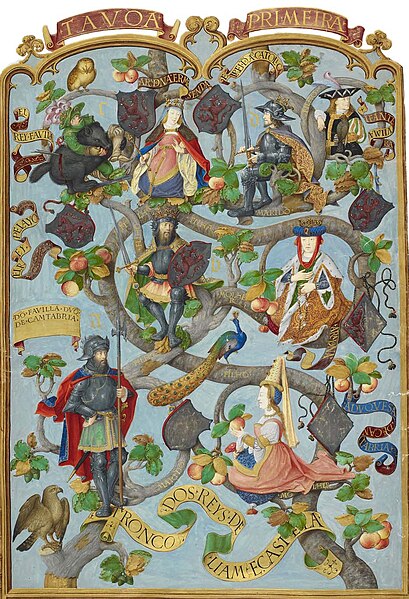Pelagius was a Hispano-Visigoth nobleman who founded the Kingdom of Asturias in 718. Pelagius is credited with initiating the Reconquista, the Christian reconquest of the Iberian Peninsula from the Moors, and establishing the Asturian monarchy, making him the forefather of all the future Iberian monarchies, including the Kings of Castile, the Kings of León, and the Kings of Portugal.
A depiction of the Battle of Covadonga in a decorated initial from a 12th-century illustrated manuscript of the Liber testamentorum. Pelayo, crowned and holding a cross, is leading at the top.
Ducado de Cantabria in 739 : Pelagius son of Favila Duque de Cantabria. "Genealogia dos Reis de Portugal" 1530
Imaginary portrait by Luis de Madrazo.
The Visigothic Kingdom, Visigothic Spain or Kingdom of the Goths occupied what is now southwestern France and the Iberian Peninsula from the 5th to the 8th centuries. One of the Germanic successor states to the Western Roman Empire, it was originally created by the settlement of the Visigoths under King Wallia in the province of Gallia Aquitania in southwest Gaul by the Roman government and then extended by conquest over all of Hispania. The Kingdom maintained independence from the Eastern Roman or Byzantine Empire, whose attempts to re-establish Roman authority in Hispania were only partially successful and short-lived.
Visigothic Kingdom
Theodoric I by Fabrizio Castello (1560–1617)
Clovis I fights the Visigoths
Visigothic pseudo-imperial gold tremissis in the name of Emperor Justinian I, 6th century: the Christian cross on the breast defines the Visigothic attribution. (British Museum)







